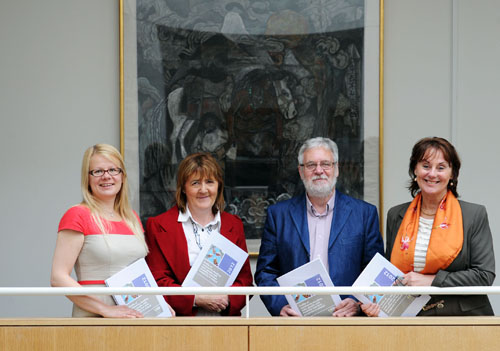New Report highlights Unpaid Care Work by Older People Underpins the Irish Care System
Posted on: 07 June 2012
A new report on caregivers and the Irish care system for older people in Ireland was launched in Trinity College Dublin.
As the population of Ireland ages, the challenge of care provision for older people is to the forefront in public policy discussions. These discussions tend to focus on older people as recipients of care and as a drain on resources. A new report from The Irish Longitudinal Study on Ageing, TILDA demonstrates that the majority of care-givers are in fact older adults themselves. The most typical caregiver to an older person living in the community is their own spouse. Care of older people is therefore increasingly care byolder people. Adult children continue to play a role, but the rise of the older spousal carer is the most noteworthy emerging aspect of the “care landscape” in Ireland.

Associate Professor in Social Policy and Ageing, Virpi Timonen; Carers, Tom Curran and Harriet Conlon; Professor of Geriatric Medicine Rose Anne Kenny, lead academic of TILDA.
Commenting on the report findings, its lead author, Associate Professor in Social Policy and Ageing, Virpi Timonen of Trinity College Dublin stated: “Care policy in Ireland is woefully neglectful of the fact that older people provide the bulk of care to other older people. Older carers remain largely unrecognised and unsupported in their enormous efforts to provide care. This is saving the state billions of euro per year, but only one in ten older spouse carers are receiving the carer’s allowance or benefit.”
“More needs to be done to support ageing family carers, both adult children and spouses, especially as some of them have disabilities and care needs themselves. In the absence of additional supports to ageing carers, the current reliance on unpaid care in the community will prove unsustainable and a shortfall of care will have to be met from formal sources.”
Only one in ten care-givers to older people in communities across Ireland is paid, the remaining nine out of ten are unpaid. Among paid carers who provide care in the home, the considerable number of those who are not attached to any provider organisations highlights the importance of regulating this sector.
The report, entitled Profile of Community-Dwelling Older People with Disability and their Caregivers in Ireland, was launched today at a media briefing where Associate Professor Virpi Timonen outlined the key findings of the report. Three older carers, members of the Carers’ Association, also outlined their experiences of caring for family members and responded to the report findings.
Key Findings
-
Among community-dwelling older people in Ireland, 11% of men and 14% of women aged 50+ have at least one limitation in daily activities. This translates into 164,000 older adults with care and support needs living in communities across Ireland.
-
The vast majority of caregivers for community-dwelling older people (89.5%) are unpaid. The remaining 10.5% are paid caregivers.
-
Among older people who get help with personal care and household tasks, assistance from family members and friends amounts to 30 hours per week on average.
-
The majority of caregivers are aged 50 and over. This reflects the enormous contribution that the ageing population is making to the care of older family members.
-
Spouses are most frequently identified as the main caregiver.
-
Seven out of 10 main caregivers are women.
-
Of paid caregivers, 62% are contracted through the formal home care sector. 38 % are not affiliated to any organisation or company.
-
Among spouse carers, 11.7% receive the carer’s allowance or carer’s benefit. This finding calls for discussion on additional ways of supporting ageing spouse carers.
About TILDAThe Irish Longitudinal Study on Ageing (TILDA) is a large-scale, nationally representative study of 8,178 people aged 50 and over in Irelandcharting their health, social and economic circumstances over a 10-year period. It is the most ambitious adult study ever carried out in Ireland and represents a step-change in terms of data, knowledge and understanding of ageing with which to inform policy and novel research.
